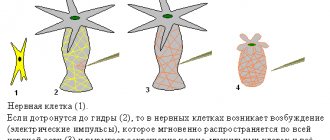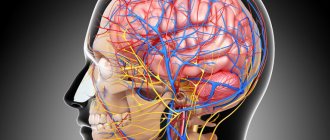Drinking alcohol in large quantities not only leads to the development of persistent addiction, but also provokes the destruction of brain cells. The longer a person drinks, the more his nervous system suffers, and his mental abilities are significantly reduced. If treatment is not started, alcoholism leads to complete personality degradation.
- Read in the article:
- How alcohol affects brain function: mechanism of action
- How many brain cells does 100 grams of vodka kill?
- How does the brain die from alcohol?
- The effect of alcohol on the nervous system
- Stages of brain damage by alcohol
- Cerebellum and alcohol
- How does alcohol affect the brain?
- The brain of a drinker: photo
- The effect of alcohol on the blood vessels of the brain
- How long does it take for the brain to recover after alcohol?
- Causes of cerebral edema from alcohol
- Why do alcoholics have strokes?
- Effect of alcohol on memory
- How does wine affect blood and blood vessels?
- Detoxification of the body from alcohol in
Treatment prices:
| Sign up for a free and anonymous consultation with a narcologist | 0 ₽ |
| Initial consultation with a narcologist | for free |
| Consultation with a psychologist in person or Skype | 3 000 ₽ |
| Psychiatrist consultation | 5 000 ₽ |
| Psychodiagnostics / pathological diagnostics | 7 500 ₽ |
| Narcopsychotherapy | 50 000 ₽ |
| Consultation with a psychologist and selection of a treatment and rehabilitation program for an addict | for free |
| Intervention session | 12 000 ₽ |
| Social rehabilitation of alcohol addicts | for free |
| Outpatient rehabilitation in Moscow | 33 000 ₽ |
| Standard rehabilitation program | 40 000 ₽ |
| Intensive rehabilitation program | 80 000 ₽ |
| Premium rehabilitation program | 120 000 ₽ |
| Medical and social rehabilitation (21 days) | 150 000 ₽ |
| Rehabilitation Spain, Bulgaria | 200 000 ₽ |
| VIP rehabilitation program | 350 000 ₽ |
| Online addiction rehabilitation course | 28 000 ₽ |
| Rehabilitation of age-related alcohol addicts | 50 000 ₽ |
| Rehabilitation of drug addicts | 60 000 ₽ |
| Adolescent social-psychological-pedagogical rehabilitation | 70 000 ₽ |
| Psychotherapy | 5 000 ₽ |
| Family psychotherapy | 6 000 ₽ |
| Support groups for loved ones of addicts | for free |
| Webinars for relatives of addicts | for free |
| School for codependents | 3 000 ₽ |
| Transfer support | negotiable |
| Motivation for treatment | 6 000 ₽ |
| Escort to the clinic | 6 000 ₽ |
| Testing (urine/blood/hair) | specify |
Expand
Still have questions? Call us!
8
Free consultation and appointment
Literature:
- On the influence of alcohol, smoking and drug addiction on the mental and physical development of a teenager / K. Kadyrov; Ped. island of the UzSSR. - Tashkent: Ukituvchi, 1988. - 27 p.
- Prevention and correction of mental development disorders in children with family alcoholism: a manual for psychologists and teachers / E. M. Mastyukova, G. V. Gribanova, A. G. Moskovkina. — Moscow: Humanitarian. published VLADOS center, 2006 (Velikiye Luki: Velikiye Luki City Printing House). — 115 s.
- Healthy lifestyle and bad habits of adolescents: textbook / L. A. Korneeva; Transbaikal State humanities-ped. University named after N. G. Chernyshevsky. - Chita: ZabGGPU, 2009. - 156 p.
How alcohol affects brain function: mechanism of action
In severe alcohol addiction, ethanol, which is part of alcohol-containing drinks, has a destructive effect on the functioning of the brain and all organs. Drinking even a small amount of alcohol leads to muscle relaxation and causes a feeling of euphoria. The distribution mechanism of ethanol is such that its highest concentration occurs in the brain tissues, and not in the circulatory system. Therefore, it is the brain that suffers the most.
When drinking alcohol, the functioning of neurons is suppressed. This is manifested by the following symptoms:
- Concentration decreases.
- Memory is impaired.
- Brain abilities decrease.
When a person begins to drink systematically, neurons stop performing their direct functions, and this leads to irreversible consequences.
Alcohol and mental activity
Alcohol disrupts mental processes of an associative nature. This is a scientifically proven fact. As a consequence, the brain includes only the basic mental operations responsible for perception. Intellectual activity decreases.
VND centers affected by drinking are affected. It takes several weeks for them to start working fully after a one-time alcohol poisoning. With alcoholism and prolonged drinking bouts, there is no need to talk about complete recovery at all. The situation is improving very slowly. For the brain to start working stably, at least one year must pass. During this entire period, the drunkard should not drink alcohol.
Speaking about the effect of alcohol on mental activity, one cannot fail to mention that it destroys neurotransmitters. Hence the feeling of anxiety, constant mood swings, and depression. Patients lose the ability to correctly express their emotions and feelings. It is very difficult to communicate constructively with them.
Fight alcoholism competently - seek help from a narcology clinic. Don't let alcohol addiction turn you into a "close-minded Neanderthal." Value your mind and intellect. Don't let alcohol ruin your life.
How many brain cells does 100 grams of vodka kill?
When consumed, alcohol immediately enters the bloodstream and reaches the brain within 5 minutes. The first effect of euphoria occurs due to the release of endorphins, so the person begins to feel happy and sociable. Alcohol does not kill brain cells, but it does have short- and long-term effects on them. If you drink 100 grams of vodka, 8,000 nerve cells will be damaged.
The effect of alcohol on the nervous system
Alcoholic drinks affect the functioning of the central nervous system in two ways:
- Penetrates nerve cells and affects receptors and ion channels.
- Activates the functioning of certain brain receptors.
When drinking alcohol, the nervous system is in an excited state. Ethanol stimulates the release of dopamine, which increases activity and gives a person a feeling of euphoria. After resources are depleted, the opposite effect occurs - weakness, depression, and poor health appear.
Hangover and the brain
Ethanol destroys cells and brain vessels within a few hours. This condition is called a hangover. Its symptoms: nausea, vomiting, diarrhea, thirst, dizziness, increased blood pressure, oxygen starvation, general fatigue. The reason for this is toxic damage to the liver by the breakdown product of ethyl alcohol - acetaldehyde.
Another common hangover symptom is depression. It occurs due to the fact that a drunk person is under the influence of dopamine, which is produced by the brain when intoxicated. In the morning, its level decreases and instead of joy and excitement, depression and lethargy come.
Stages of brain damage by alcohol
Alcohol destroys neural connections, due to which there are more and more receiving receptors, and it is more difficult to activate them each time. Brain damage develops in stages and has three stages:
- First . There is a constant desire to drink, the craving for alcohol becomes systematic.
- Average . After drinking alcohol, a severe hangover begins and a strong psychological need for alcohol-containing drinks develops. Diseases of the internal organs begin to develop.
- Heavy . The person degrades, alcoholism becomes chronic.
How does alcohol affect the brain?
The human brain is a complex neural structure, all areas of which are closely interconnected. All of them are responsible for the coordination of movements, for the transmission of information, and for the functioning of internal organs. The normal functioning of brain cells allows people to express their thoughts and feelings, communicate, and remember information.
Regardless of what a person drinks - beer, vodka or cognac, ethyl alcohol enters the body. The harmful substance instantly affects all areas of the brain, leading to the following changes:
- The level of thinking decreases.
- Lost control over movements.
- Drowsiness appears.
- Consciousness becomes cloudy.
- Speech is confused.
Regular drinking causes the addict to become lethargic, develop insomnia, and experience frequent outbursts of aggression. There are frequent cases of the development of mental disorders.
You keep getting drunk...
You drink further, and at this stage your tongue most likely begins to slur. The memory shuts down because the glutamate receptors are blocked, and you start repeating and repeating and repeating.
In addition, you probably begin to find many things funny, including the very things that you persistently repeat, due to the activation of the serotonin system and the GABA system. Alcohol suppresses the brain centers that control coordination of movements, and your legs can no longer support you.
When dopamine levels rise and self-control fails, you are tempted to engage in conflict. You also start doing some stupid things: you light up a cigarette even though you quit a long time ago, you drive drunk, you start racing shopping carts - simply because you are not able to think straight. Getting drunk seriously impairs your brain's performance, an effect that can be compared to a computer virus.
Continuing to drink, you are moving towards complete anesthesia, towards blackout. By the way, medical anesthesia also affects the glutamate and GABA systems. Before the invention of modern anesthetics, sailors facing amputation were drugged with alcohol until they were unconscious before the operation. And there is a reason for this: alcohol reduces pain sensitivity, and at the same time turns off memory. Anesthetics used for minor surgery stimulate the release of GABA to put you to sleep. During major surgeries, medications are used to reduce the level of glutamate that keeps you awake and alive. This is why artificial ventilation is required in such cases - the patient can no longer breathe on his own.
The fact that alcohol affects both the GABA and glutamic acid systems (the aforementioned double whammy) is what makes it so dangerous. GABA and glutamate regulate not only the balance of sleep and wakefulness, but also all vital processes of the body. This is why people die from alcohol poisoning. If you drink enough, you'll simply stop breathing.
The effect of alcohol on the blood vessels of the brain
When alcohol enters the body, it constricts blood vessels in the brain. As a result, red blood cells moving through the circulatory system stick together and turn into blood clots. Such clots prevent oxygen from reaching the brain, causing nerve cells to die. With each new alcoholic drink consumed, a person's risk of stroke increases.
Scientific research that makes you think
German scientists studied the effect of alcohol on mental activity using guinea pigs as an example. They gave the animals a dose of ethanol equivalent to two glasses of wine. As a result, the content of the component in the blood increased by approximately 0.05%.
After this, the rodents' brains were thoroughly examined using MR spectroscopy. Diagnostics showed that 6 minutes after drinking, brain cells began to change. The content of creatine, which is recognized as the main energy source, decreased in neurons. The vacated space was quickly occupied by ethanol molecules.
The amount of choline in cell membranes also decreased. This vitamin component is needed for the occurrence and passage of neural signals. Without it, the nervous system cannot function stably. Choline deficiency causes a decrease in intellectual activity. This suggests that the effect of alcohol on mental activity is extremely negative.
It should not be assumed that the findings apply only to guinea pigs. In these animals, metabolism proceeds almost the same as in humans. Therefore, test results are easily extrapolated to the human body.
How long does it take for the brain to recover after alcohol?
Scientists have proven that after an addict stops consuming products containing ethyl alcohol, the brain suffers for a long time. After giving up drinking, a person continues the recovery process for about six weeks. Even when alcohol is not supplied, the body cannot quickly restore cognitive abilities such as attention and memory. The duration of recovery is influenced by the following factors:
- Alcohol is a powerful diuretic, as a result of which the body loses a lot of fluid during the period of drunkenness. Dehydration occurs and the meninges shrink.
- Along with urine, nutrients such as magnesium, sodium and potassium, which are necessary for normal brain function, are washed out of the body. It takes time to make up for their deficiency.
To avoid all the negative consequences of drinking alcohol, you should stop drinking them forever. If you cannot get rid of addiction on your own, then you need to go to a drug treatment clinic.
What happens to the brain when you drink alcohol too much?
The liver, nervous system and brain receive the main blow from alcohol abuse. Ethyl has a detrimental effect on the brain.
The human meninges need constant and active blood circulation, which sufficiently supplies them with oxygen. Blood inside the brain passes through all its vessels, including the smallest vessels and the finest capillaries, especially many of which are located in the peripheral areas of the brain.
Alcohol entering the human body from the first minutes of consumption has a destructive effect on blood vessels and capillaries. Alcohol narrows them even more and, as it were, “glues” the red blood cells, the so-called erythrocytes. As a result, blood clots form, which seem like huge plugs to the peripheral capillaries. They do not allow oxygen to reach brain cells, which die irrevocably without oxygen access.
Bleeding and death of brain cells is most often the cause of ischemic stroke, a very dangerous disease. Interestingly, the process of death of brain cells has a euphoric effect on the drinker. To some extent, it pleasantly excites him, but deprives him of the ability to think logically and really perceive reality.
Causes of cerebral edema from alcohol
The main cause of cerebral edema is severe intoxication of the body due to alcohol poisoning. The following factors can also trigger swelling:
- Manifestation of allergic reactions . Often, due to drunkenness, a severe allergy develops, which causes swelling.
- Bruises, traumatic brain injuries . People who abuse alcohol may fall or get hit by a car due to poor coordination of movements, so they have an increased risk of injury.
- Poor blood circulation in the brain or, in other words, a stroke . Weak blood vessels in the brain of an alcoholic cannot withstand the load, which leads to stroke and edema.
- Development of cardiac, hepatic or renal pathology . These important organs are primarily affected by alcoholism.
Effect of alcohol on memory
Alcoholic drinks negatively affect memory. A person may experience short-term memory lapses, as well as complete memory loss while drinking. The next day, the addict may forget absolutely everything he did, although his drinking buddies say that he was awake. Under the influence of ethanol, the memory function of the brain changes. Ethanol is a powerful toxin, and if the brain is severely intoxicated, it can change the type of synoptic transmission. Therefore, the brain simply stops working normally.
How does wine affect blood and blood vessels?
Wine, consumed in small doses, can benefit the body. First of all, the drink is beneficial for blood vessels. Wine contains substances that increase the strength and elasticity of the walls of blood vessels.
- Red wine . Dry wines are the most beneficial. They contain magnesium, potassium, antioxidants and fructose. Dilates blood vessels provided you drink no more than 100 ml per day.
- White wine . Contains fewer antioxidants than red wine, but is also rich in nutrients. Reasonable consumption helps strengthen the immune system.
Still have questions? Call us!
8
Free consultation and appointment
How to relieve a hangover
You cannot “cure” a hangover. Getting hungover is the worst thing you can do. Poisoning your brain with alcohol again will only prolong the hangover. All you can do is relieve the symptoms.
- Take anti-inflammatory drugs. For example, ibuprofen - before bed and/or when you wake up. Ideally, with food, because otherwise ibuprofen can damage the gastric mucosa.
- Replenish lost fluids. Half a liter of water before bed and the same amount in the morning. Electrolytes and sports drinks restore salt balance. This technique has not been studied in depth, but in theory it makes sense.
- Eat. You'll likely wake up with low blood sugar, which is why eating carbohydrates will make you feel better. Eggs contain many of the very nutrients you need right now.
- Have some coffee. Caffeine in any form—if you can swallow it—will help you feel more alert. Coca-Cola (carbonated or straight) contains three ingredients that can relieve a hangover: carbohydrates, water and caffeine.
- Try probiotics. They are known to reduce intestinal permeability, and in a small study of chronic alcoholics they were also shown to reduce inflammation.
- Move around. In theory, all types of exercise speed up your metabolism and can help you cope with a hangover. If, of course, you find the strength to take advantage of this advice.
To summarize, although a hangover may mean that you are less likely to become an alcoholic, I hope that the rest of the information will help you realize how much harm alcohol can cause as it travels through the body.
The book is provided by Alpina Publisher. You can purchase it here.
Detoxification of the body from alcohol in
With prolonged consumption of alcohol, toxic substances formed during the breakdown of ethanol accumulate in the body. To get rid of poisons and toxins, you should detoxify your body. Specialists of the drug treatment center carry out the cleansing procedure in the hospital and at home.
Professionals use IVs, intravenous and intramuscular injections for this purpose. All medicines are certified and highly effective. Only an individual approach from specialists, drug therapy and rehabilitation will help you get rid of alcohol addiction forever.
"Alcoholism causes more devastation than the three historical scourges combined: famine, plague, and war."
W. Gladstone
In addition to smoking, bad habits include an even more harmful one - alcohol consumption. Unfortunately. In life they are very often combined with each other. Thus, among the non-drinking population, 40% are smokers, and among alcohol abusers, the figure is already 98%.
The harm of alcohol is obvious. It has been proven that when alcohol enters the body, it spreads through the blood to all organs and adversely affects them, even to the point of destruction. With systematic alcohol consumption, a dangerous disease develops - alcoholism. Alcoholism is dangerous to human health, but it is treatable, like many other diseases.
But the main problem is that most of the alcoholic beverages produced by non-state enterprises contain large amounts of toxic substances. Poor quality products often lead to poisoning and even death.
All this causes great damage to society and its cultural values.
Drinking 'gives a green light' to cancer. The presence of carcinogenic substances in alcoholic beverages cannot be ruled out. Being a good solvent, alcohol helps them penetrate the body. Those who drink alcohol heavily, especially at a young age, have a 10 times higher risk of developing oral cancer, and if they also smoke, a 15 times higher risk than non-drinkers.
As already mentioned, alcohol has a detrimental effect on brain cells (including cells that regulate the activity of the reproductive system) and on the reproductive centers located in the spinal cord. At the same time, the activity of the mammary glands weakens, and in the future it may stop. Scientists identified healthy gonads in only half of the chronically alcoholic patients they examined. It has been established that men who abuse alcohol experience a weakening of potency. In women, alcohol disrupts the production of sex hormones, egg maturation, and the menstrual cycle.
The main active source of intoxication for any drink was alcohol - ethyl, or wine, alcohol. Taken orally, it is absorbed into the blood within 5-10 minutes and spread throughout the body. Alcohol is poison for any living cell. Once alcohol enters the body, it very quickly disrupts the functioning of tissues and organs. Burning quickly, it takes away oxygen and water from them. The cells shrink and their activity becomes difficult. When significant and frequent exposure to alcohol enters the body, the cells of various organs eventually die.
Under the influence of alcohol, almost all physiological processes in the body are disrupted, and this can lead to serious illnesses. The tissue of the liver, kidneys, heart, blood vessels, etc. is degenerated.
Alcohol has the fastest and most destructive effect on brain cells, with the higher parts of the brain primarily affected. Rapidly delivered by blood flow to the brain, alcohol penetrates nerve cells and is destroyed, resulting in disruption of communication between different parts of the brain.
Alcohol also affects the blood vessels that carry blood to the brain. First, they expand, and blood saturated with alcohol rushes rapidly to the brain, causing a sharp excitation of the nerve centers. This is where the overly cheerful mood and swagger of a drunken person come from.
Scientists have found that under the influence of alcoholic drinks in the cerebral cortex, following increasing excitation, a sharp weakening of inhibition processes occurs. The cortex ceases to control the work of the lower, so-called subcortical parts of the brain. That is why an intoxicated person seems to lose control over himself and a critical attitude towards his behavior, losing restraint and modesty, he says and does things that he would not say or do in a sober state. Each new portion of alcohol increasingly paralyzes the higher nerve centers, as if connecting them and not allowing them to interfere with the chaotic activity of sharply excited parts of the brain.
What we complacently call intoxication in everyday life is essentially nothing more than acute alcohol poisoning, with all the ensuing consequences. It is good if after a certain time the body, freed from the poison, gradually returns to its normal state. What if drunkenness continues, and new portions of alcohol systematically enter the body? What then?
Scientists have found that alcohol introduced into the body is not immediately removed from there, and a certain amount of this substance continues its harmful effect on organs for 1-2 days, and in some cases more.
Alcohol causes a pleasant, elated mood, and this encourages repeated drinking. At first, if you wish and have strong character, you can still refuse wine. Otherwise, under the influence of alcohol intoxication (and the persuasion of friends), the will weakens, and the person can no longer resist the attraction to alcohol.
Under the influence of alcohol, instincts gain scope, will and self-control are weakened, and often people commit offenses and mistakes that they repent of throughout their lives.
Many people see nothing wrong with drinking alcohol in the evening, on weekends or on holidays. But few people have a sense of proportion and willpower. And a seemingly harmless hobby turns into a bad habit. This article provides 25 reasons for giving up alcohol, discusses the harm of alcohol and its effect on the human body.
- Alcohol is the cause of many diseases, meanness, indiscipline, wasted talents, meaningless conflicts and poverty.
- It is difficult to find a greater evil than alcohol, which would so persistently and mercilessly upset the health of millions of people, so dramatically destroy all human tissues and organs (especially the cerebral cortex), the mind and personality of a person, ultimately leading him to early death. The insidiousness of this poison lies in the fact that serious consequences from the harm of alcohol do not occur immediately, gradually, imperceptibly.
- The influence of alcohol on a person’s life is evidenced by the following facts: 50 percent of accidents, 1/3 of suicides, 80 percent of deaths from cancer of the oral cavity and esophagus occur due to alcohol abuse.
- As a result of research conducted using the latest technology, Australian scientists have concluded that both alcoholics and moderate users experience a gradual decrease and shrinkage of the brain. A glass of alcoholic drinks destroys 1000-2000 cells in our brain. These data were confirmed in 95% of alcoholics and 85% of moderate drinkers.
- Studies have proven that the likelihood of drinkers giving birth to a healthy person is 15 times less than that of non-drinkers, the mortality rate in their children is 5 times higher, and morbidity is 3.5 times higher (note that we are talking only about drinkers, not about alcoholics). Alcohol affects children even before they are born. Even in families that drink alcohol moderately, children are born with slow development, mentally underdeveloped, and even dead. Due to addiction to alcohol and drugs, women in America alone give birth to thousands of premature babies every day. Drinking parents are the worst thieves, stealing from their own children the happiness of future discoveries, the happiness of living a full life (according to F.G. Uglov).
- Experiments conducted on chicken eggs showed the following: 160 eggs were placed under a hen in a barn, in the basement of which alcohol was brewed. The alcohol vapor affected the eggs. When the time came, the following result was obtained: only half of the chicks hatched, 40 of them were dead, 25 were mutants (without a beak, without claws, etc.).
- If a person’s genetic code is damaged, the entire generation is in danger. Nowadays, 96% of genetic code violations occur due to various drugs (alcohol, cigarettes, other drugs).
- Alcohol as a drug is harmful in all forms and in any dose to the human body, because it acts like morphine or marijuana, that is, it creates the illusion of goodness and happiness, while causing irreparable harm, like any other poison.
- According to WHO (World Health Organization), every third person on earth dies from causes related to alcohol consumption, and every fifth person dies from causes related to smoking. This means that from these reasons in Russia we lose almost one and a half million people a year, which is 20 times higher than the number of victims of the atomic explosion in Hiroshima.
- Prohibition operated successfully in Russia at that time for more than 10 years. During this period, the number of sick people decreased, prisons were emptied, peace came to families, and prosperity appeared in homes. All this data can be checked using a large medical encyclopedia and many scientific works of that time.
- The assurances of some heavy drinkers that after drinking they feel relief is pure self-deception caused by paralysis of the centers of attention and self-control. The patient, after taking any dose of alcohol, falls into a state of euphoria, and everything, even his own illness, appears rosy. In fact, drinking alcohol in any quantity only aggravates the process and harms the person.
- It’s not for nothing that people say: “A river begins with a stream, and drunkenness begins with a glass.” Let's think about this fact. From the point of view of contagiousness of the habit of drinking alcohol, it is not drunkards and alcoholics who are more dangerous, because, looking at them, no one will have the desire to imitate them. More contagious is the example of those who drink “moderately”, “culturedly”, who drink “observing a ritual”, etc. Unfortunately, our media have “worked hard” to present the feast in a broader and more seductive way. Rarely does a film go without a glass, lavish celebrations, and toasts. People drink enthusiastically after these toasts, almost mystically hoping that an empty glass or shot glass is the surest way to fulfill their cherished desires. And children become spectators and witnesses, and then accomplices in drinking alcohol, because they imitate their parents on a subconscious level.
- Many researchers have shown that if children are invited to play on a birthday or wedding, they reproduce and copy the attributes of an adult feast in games - they sit at a common table, open bottles, clink glasses, say toasts, and walk with a staggering gait. (B.S. Bratus, P.I. Sidorov 1984) A survey of 100 boys in one of the kindergartens showed that 97% of children described alcohol intoxication well. From kindergarten age, the idea of alcohol begins to form as a special, obligatory companion to celebrations and meetings, an attractive symbol of adult life. By the age of 11-12, adolescents form quite stable stereotypes of attitudes towards drunkenness. They copy their parents and loved ones in this.
- Teenagers assert themselves by who drinks more. Euphoria is cultivated in such companies. Teenagers project their ideas about courage, masculinity, maturity onto alcoholism; they induce each other to see who is drunker, who screams or laughs or squeals louder, who behaves more cheekily. There is a lot of ostentatious, demonstrative, hysterical behavior. Loud music is usually played, increasing destructive behavior.
- According to statistics, people who drink live on average 10-15 years less. Smoking people for 8 years. This directly shows the harm of alcohol on the human body.
- The short answer to the question of why people drink is: they drink because it is a drug that is widely advertised and freely sold. They drink because alcohol has been made a legal drug and is sold at a cheap price.
- There is a misconception that alcohol should be taken “to have fun.” In fact, fun and laughter are very important moments in a person’s life. They give rest to the brain, distract thoughts from everyday worries, thereby strengthening the nervous system, preparing it for new work and worries. But laughter and fun are useful only in those cases when they arise in a sober person. There is no and cannot be drunken fun in the scientific and reasonable understanding of this state. Drunken “fun” is nothing more than excitement under anesthesia - this is the first stage of anesthesia, the stage of excitement that surgeons observe every day when giving the patient other drugs (ether, chloroform, morphine, etc.), those that are identical in their effects with alcohol and in the same way as alcohol is related to drugs. This stage of excitement has nothing to do with fun and after it there is no rest for the nervous system. On the contrary, instead of rest, depression sets in with all the consequences (headache, apathy, weakness, reluctance to work, etc.). Which is never observed in sober fun. So alcohol is not a friend, but an enemy of fun. It eliminates the time that a person sets aside for fun and relaxation. Instead, he gets a headache and fatigue. Alcohol acts in the same way when you are tired. A day off is given to a person so that he can rest physically and mentally and, with new strength and a new desire to work, get to work after resting.
- Alcohol creates the illusion of stress relief. In fact, the tension in the brain and throughout the nervous system remains, and when the hops wear off, the tension turns out to be even greater than before drinking wine. But to this is added a weakening of the will and weakness.
- An innate need to drink beer, wine, vodka, etc. people don't. If there were no alcoholic beverages in the world and no traditions of drinking them, one could live without them in peace and not cause harm to one’s body and loved ones.
- To make a conscious choice “to drink or not to drink,” you need to know for yourself how alcohol affects our body. “Advertisers” can make up any legends about the benefits of alcohol. In television commercials they call beer “correct”, “life-giving”, “for real men”, they try to “link” alcoholic products with sexual, patriotic, national, high-status characteristics of people. In order not to be deceived, you must have objective information yourself and learn to counter advertising.
- After drinking alcohol, the amount of urine excreted increases (diuresis), that is, water and salts are lost. After intoxication, there is a strong thirst, “pulling” for brine and mineral waters. A brief systematic review of the real effects of alcohol on all types of metabolism in a living organism leads to one conclusion: all types of metabolism are disrupted. It is this combination of “killer” effects that determines the antiseptic effect of ethyl alcohol and should be an obstacle to its use as drinks.
- The phrase “alcoholic drinks” is incorrect. “Drinks” must have nutritional value and contain substances involved in nutrition. These include proteins, fats, carbohydrates, minerals, and vitamins. They are not found in alcohol. There is very little in cognacs, wines and beer. To gain their daily amount, you need to drink a quantity of these liquids in which the alcohol content is many times higher than its lethal dose.
- For example, you can buy a car for the money you spend on booze. You can calculate for yourself how much money you spend on alcohol over the course of months and years.
- There are often references to studies by foreign scientists, for example, a number of institutes from Munich, proving that beer helps with many diseases. First of all, it should be noted that all such studies were conducted with financial support from the alcohol industry. Therefore, such results roam the media, but they are difficult to find in serious scientific journals, since such journals usually ask the authors to indicate the source of funding for the research, and if this is the alcohol or tobacco industry, then the publication of such studies is perceived as a sign of bad taste .
- You have the power to get rid of another addiction, become free and happy!










